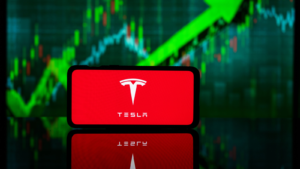
Despite all the negative talk about electric vehicles (EVs) in 2023, Tesla (NASDAQ:TSLA) stock isn’t doing too badly, up 105%, more than double the Nasdaq-100. Yet all anyone seems to be able to talk about is how toxic EV stocks are heading into 2024.
The reason for the negativity involves the slowing demand for EVs.
“We’re taking immediate steps to enhance the profitability of our EV portfolio and adjust to slowing near-term growth,” Reuters reported GM CEO Mary Barra’s comments to analysts.
Elon Musk suggested on his company’s conference call that higher interest rates make it harder to find buyers willing to part with their hard-earned capital. All across the industry, car company executives have sounded the alarm bells.
However, the data suggests things aren’t so bleak.
“EV sales are growing, however. They topped 300,000 units in the United States for the first time in the third quarter, according to a Cox Automotive report. They rose 14.3% in September in the European Union and 22% in China, the world’s largest EV market,” Reuters reported.
Investors look at significant acquisitions by Exxon Mobil (NYSE:XOM) and Chevron (NYSE:CVX) and believe it is a sign that oil executives know what’s reality and what’s not.
That’s pure poppycock. They just want to be the last ones selling oil through the transition to electric. They know it’s coming.
Here are three EV stocks to buy to profit over the next decade.
BYD (BYDDY)

Berkshire Hathaway (NYSE:BRK-A, NYSE:BRK-B) owns $2.7 billion in BYD (OTCMKTS:BYDDY) stock. Warren Buffett’s holding company only owns $606 million in General Motors (NYSE:GM), a sign that he believes the Chinese automotive company will be a leader in the globalization of EVs.
Bloomberg reported at the beginning of November that BYD delivered another record month in October of selling both battery electric vehicles (BEVs) and hybrid electric vehicles (HEVs). As a result, it will soon pass Tesla for quarterly pure-EV sales.
BYD sold 301,095 electric and hybrid vehicles in October, nearly 40% higher than a year earlier. According to Bloomberg, BYD sells one-third of all the new-energy vehicles in China. It passed Volkswagen (OTCMKTS:VWAGY) as the number-one seller of autos in China for the first time in history.
BYD has a goal to sell 3.0 million new energy vehicles in 2023. With two months to go, BYD needs to sell quite a bit over the final two months of the year. It’s going to be close.
In the long term, BYD will run circles around America’s biggest car companies.
Tesla (TSLA)

One alarming data point about Tesla is that the company’s biggest fan — portfolio manager Cathie Wood — has been reducing her position in the world’s largest pure-play EV company.
Tesla accounts for 8.68% of Wood’s ARK Innovation ETF (NYSEARCA:ARKK), her firm’s largest ETF by net assets. It is no longer the fund’s largest position but rather the third-largest. In June, it accounted for 12.5% of ARKK and was the largest.
Now, that doesn’t mean investors should read into the change.
“We will sell some and redeploy into stocks that have either been hit by some very short-term concern or have underperformed significantly relative to Tesla for some other reason,” Wood recently told Bloomberg.
It makes sense.
In the past year, TSLA stock has experienced extreme volatility, both up and down. In January, it was under $110. By mid-February, it had nearly doubled. That’s one possible time to trim. Another would come in July. In late April, it traded around $154. By mid-July, it had nearly doubled once more. Trim some more. A third big move between mid-August and mid-September brought another opportunity to take profits.
When you consider Wood’s not bringing in new assets like she once did, one of the only ways to deploy capital in the short-term is by reallocating assets until Tesla falls again, rebuying the decline.
The biggest issue for Elon Musk and Tesla in the near term might be avoiding total embarrassment with the launch of the much-anticipated Cybertruck. A pre-production version was seen in California recently, and the comments posted about its looks were not encouraging.
Ultimately, Musk will figure it out. In the meantime, they’ll just have to sell lots of the updated Model 3.
Volkswagen (VWAGY)

I recently saw a Volkswagen ID.4 driving on the streets of Halifax, where I live. It looked good live and in person. Of course, the ID Buzz earned all kinds of rave reviews from automotive critics.
“While most minivans struggle to be anything but appliances, there is a coolness and quirkiness, a charming mix of style and practicality to the ID Buzz that’s hugely appealing,” MotorTrend’s review concluded.
What more could you ask for?
The company’s third EV is the ID.7, a nice-looking sedan that approximates the size of the Passat, which VW retired in 2022. InsideEVs rated it 9 out of 10 when it reviewed the vehicle in April. Most importantly, its range is estimated to be 300 miles, which is good — if not great.
Investors were panicked by Chairman Oliver Blume’s comments on Nov. 1 about delaying its decision to build a fourth battery plant in Europe due to slower EV sales.
“Based on market conditions, including the sluggish ramp up of the BEV (battery electric vehicle) market in Europe…there is for the time being no business rationale for deciding on further sites,” Blume said.
As far as I’m concerned, VW has already done much more in the EV space than GM and Stellantis (NYSE:STLA). When it gets a sense that sales are reigniting, I’m sure they’ll announce a fourth factory.
VW is an excellent play to straddle the global transition.
On the date of publication, Will Ashworth did not hold (either directly or indirectly) any positions in the securities mentioned in this article. The opinions expressed in this article are those of the writer, subject to the InvestorPlace.com Publishing Guidelines.




